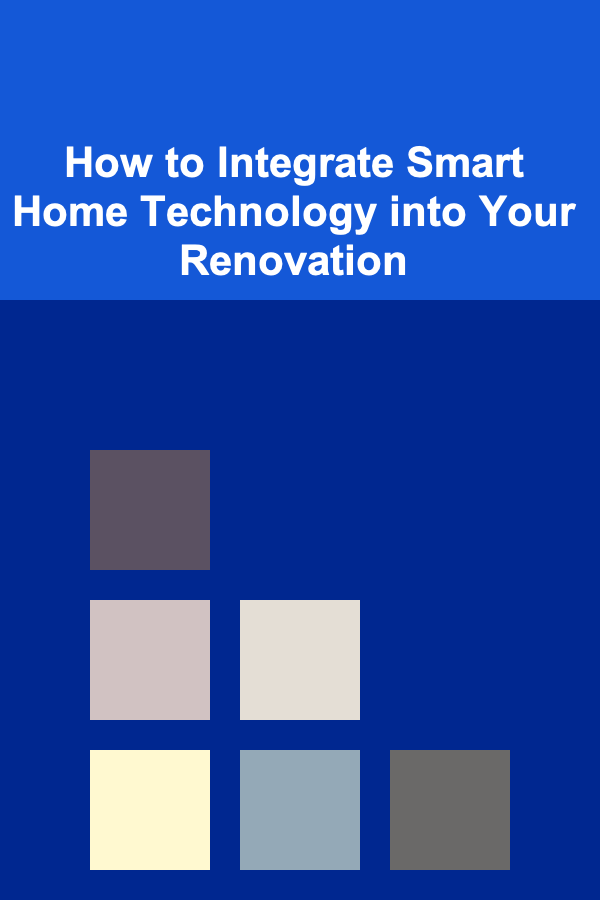
How to Integrate Smart Home Technology into Your Renovation
ebook include PDF & Audio bundle (Micro Guide)
$12.99$10.99
Limited Time Offer! Order within the next:

As smart home technology continues to evolve, more homeowners are looking to integrate it into their living spaces. Whether it's for enhanced convenience, energy efficiency, or just for the enjoyment of cutting-edge technology, adding smart home features during a renovation can significantly improve the functionality of your home.
Renovations are an excellent opportunity to upgrade your home and make it more connected, efficient, and secure. From intelligent lighting systems and advanced thermostats to voice-controlled assistants and smart security systems, the possibilities are endless. However, incorporating these technologies seamlessly into your renovation requires careful planning, understanding your needs, and choosing the right products and systems.
This guide will walk you through the process of integrating smart home technology into your renovation, offering practical tips on planning, installation, and choosing the right tech solutions.
Understand Your Smart Home Needs
Before diving into the world of smart home technology, it's crucial to define what you want to achieve with these upgrades. Smart home tech is vast, covering everything from entertainment systems to security features, and understanding your goals will help guide your decisions.
What Do You Want to Achieve?
Start by asking yourself what benefits you're hoping to get out of a smart home integration. Are you looking to make your home more energy-efficient? Do you want a smarter, safer environment? Or perhaps you simply want to add a touch of convenience? Your goals will shape your renovation decisions, including the types of devices and systems you choose.
Some common motivations for integrating smart home technology include:
- Energy Efficiency: Smart thermostats, lighting systems, and energy monitoring tools can help reduce energy consumption.
- Convenience: Smart assistants, automated lighting, and voice-controlled systems allow for hands-free control over various home functions.
- Security and Safety: With smart security cameras, doorbell cameras, and smart locks, you can improve the safety of your home.
- Entertainment and Comfort: Smart TVs, speakers, and climate control systems can provide a more customized living experience.
Once you have a clear idea of your goals, you can prioritize your smart home features accordingly. This will also help you stay focused and avoid overloading your home with technology that doesn't serve a clear purpose.
Plan Your Smart Home Integration During the Renovation Process
The integration of smart home technology requires careful planning, especially during a renovation, when walls might be open, and spaces are being restructured. To ensure the best results, integrate smart systems early in the renovation process.
Consider Smart Wiring and Networking Infrastructure
One of the most important considerations when incorporating smart home technology into a renovation is ensuring you have the proper wiring and network infrastructure. Unlike plug-and-play smart devices that rely on Wi-Fi, many systems require hardwired connections or specialized wiring for optimum performance. Planning for this in advance can save you time, effort, and money.
- Wiring for Smart Devices: Certain smart devices like lighting systems, motorized shades, and smart security cameras might need wiring to ensure reliable performance. For example, smart lighting systems may require a new type of wiring to handle dimming and automation functions.
- Cabling and Ethernet: Smart home hubs, entertainment systems, and security cameras often work best with wired connections for speed and reliability. Plan for Ethernet cabling if you need consistent data flow between devices. This is especially true if you have multiple devices operating simultaneously, such as in home theaters or for smart security.
- Network Considerations: Ensure your Wi-Fi network is strong enough to handle the increased load. You may need to upgrade your router or even add additional Wi-Fi extenders throughout your home. A mesh network can provide better coverage and reduce the chances of connectivity issues.
If you're planning on upgrading your electrical or networking systems during the renovation, now is the time to discuss your options with an electrician or smart home professional.
Identify Key Areas for Smart Home Integration
Think about the specific areas of your home where smart technologies will provide the most value. A whole-home automation system might be a good fit, but it's essential to prioritize areas that would benefit the most from being automated.
- Lighting: Smart lighting is one of the most popular and useful smart home features. It provides convenience, energy savings, and flexibility. You can control lights remotely via a smartphone app or voice commands, set them on timers, or even sync them with other smart devices.
- Climate Control: Smart thermostats like Nest or Ecobee can significantly improve energy efficiency by learning your schedule and preferences and adjusting the temperature accordingly. These devices can also be controlled remotely, saving you money by reducing heating or cooling costs when you're not home.
- Security: Home security is another critical area to focus on. A smart security system with cameras, motion sensors, doorbell cameras, and smart locks can give you peace of mind and improve safety. Many of these devices can send alerts to your phone, allowing you to monitor your home from anywhere.
- Entertainment: Smart entertainment systems, such as voice-controlled speakers, streaming devices, or integrated home theater setups, can enhance your living experience. For example, Amazon Alexa or Google Assistant can help control your entertainment systems via voice commands.
- Home Automation: Consider home automation solutions that control multiple devices simultaneously. Smart hubs like Amazon Echo or Apple HomeKit can tie all your smart devices together and allow you to control them using a single interface.
Choose the Right Smart Devices for Your Home
The world of smart home technology is vast, with countless devices and systems to choose from. When selecting smart devices for your renovation, it's important to balance your needs, budget, and long-term goals.
Consider Compatibility
Many smart home devices work best when they're part of an integrated system. For example, if you're already using a voice assistant like Amazon Alexa or Google Assistant, make sure the devices you choose are compatible with your preferred platform.
Focus on Future-Proof Solutions
Smart home technology is constantly evolving, and newer devices or features might emerge after your renovation. While it's difficult to predict the future, try to select devices and systems that allow for easy upgrades or additions in the future.
- Expandable Systems: Many smart home platforms offer expandability, so you can start with basic features and add new devices as they become available or your needs evolve.
- Software Upgrades: Look for devices that receive regular software updates, as this ensures the tech stays current and compatible with new innovations.
Budget Considerations
Smart home devices range in price from affordable to high-end, and it's important to match the technology to your budget. A fully integrated home automation system might be out of reach for some, while basic smart thermostats or lighting solutions can offer significant improvements without breaking the bank.
- Cost of Devices: Consider how much you're willing to spend on individual smart devices. While a smart speaker or light bulb might only cost a few dollars, more complex devices like smart security systems or home theater setups can add up quickly.
- Installation Costs: Some devices require professional installation, especially if they involve complex wiring or integration with other systems. Factor in these additional costs when planning your renovation.
Hire Professionals to Install and Integrate Smart Systems
While many smart home devices are designed for DIY installation, integrating them into a renovation often requires the expertise of professionals. Electrical work, network setup, and system integration can be complex, and hiring an expert ensures the systems function optimally.
Work with a Smart Home Consultant
A smart home consultant can help design a solution tailored to your needs. They can also help you select the right devices, ensure compatibility, and plan for future upgrades. Additionally, a consultant can help integrate different systems and technologies, so everything works seamlessly together.
Collaborate with an Electrician or Network Specialist
Some smart home devices require wiring or advanced electrical work. For example, hardwiring a smart thermostat, security cameras, or motorized shades will require an experienced electrician. Additionally, if you're installing a whole-home network for smart devices, a network specialist can ensure your Wi-Fi system is optimized for the number of devices you're connecting.
Work with Your Renovation Team
Ensure that your renovation contractor, electricians, and other professionals are on the same page regarding your smart home goals. The coordination between trades is essential to ensuring that everything is installed in the correct order and that no steps are missed.
Ensure Your Smart Home Systems are Secure
With the increasing connectivity of devices, cybersecurity is a key consideration when integrating smart technologies into your home. The more devices connected to your network, the greater the potential risk for hacking or security breaches.
Protect Your Network
Your home Wi-Fi network is the backbone of your smart home, and keeping it secure is crucial. Use a strong password for your router, enable WPA3 encryption if available, and consider using a separate network for your smart devices.
Update Firmware Regularly
Many smart devices receive firmware updates that improve performance or patch security vulnerabilities. Set up automatic updates whenever possible or regularly check for updates to ensure your devices are secure.
Use Two-Factor Authentication
Some smart home platforms offer two-factor authentication (2FA) for added security. Enabling 2FA on your smart home accounts adds an extra layer of protection, ensuring only authorized users can access your system.
Make Your Home Smart and Efficient
Integrating smart home technology into your renovation can significantly improve your home's energy efficiency, convenience, and security. By planning ahead, selecting the right devices, and working with professionals, you can create a connected home that meets your needs today and adapts to future innovations.
Smart home systems not only enhance your quality of life but can also increase the value of your property. As you begin to incorporate these technologies into your renovation, remember to consider your goals, budget, and long-term vision for the space.
With careful planning, your renovated home can be an intelligent, efficient, and secure living space that's equipped for the future.
Reading More From Our Other Websites
- [Organization Tip 101] How to Reflect on Your Jewelry Style Preferences for Better Organization
- [Home Security 101] How to Ensure Maximum Protection for Your Detached Garage with the Right Security Measures
- [Whitewater Rafting Tip 101] How to Plan the Ultimate Rafting Trip Worth Adding to Your Bucket List
- [Tie-Dyeing Tip 101] From Classic Swirls to Geometric Grids: Step-by-Step Tie-Dye Tutorials
- [Personal Care Tips 101] How to Choose Sunscreen That Won't Leave a White Cast
- [Whitewater Rafting Tip 101] Beginner's Blueprint: Your First Rafting Adventure Made Easy
- [Home Lighting 101] How to Choose the Perfect Lighting for Your Living Room
- [Skydiving Tip 101] Mastering the Skies: Expert‑Level Formation Skydiving Drills for International Competition Teams
- [Home Cleaning 101] How to Clean Your Home's Baseboards in Less Than 10 Minutes
- [Star Gazing Tip 101] How to Choose the Perfect Night Sky Spot: Location & Light‑Pollution Tips

How to Design a Dream Kitchen in Your Home Renovation
Read More
How to Prepare for Major Life Changes: Financial Tips for Transitions
Read More
How to Use Apps and Technology to Track Your Earnings While Riding: An Actionable Guide
Read More
The Civil Engineer's Guide: Mastering Design, Construction, and Project Management
Read More
How To Explore the Myths of the Caribbean
Read More
How to Make Healthy Fast Food Choices
Read MoreOther Products

How to Design a Dream Kitchen in Your Home Renovation
Read More
How to Prepare for Major Life Changes: Financial Tips for Transitions
Read More
How to Use Apps and Technology to Track Your Earnings While Riding: An Actionable Guide
Read More
The Civil Engineer's Guide: Mastering Design, Construction, and Project Management
Read More
How To Explore the Myths of the Caribbean
Read More